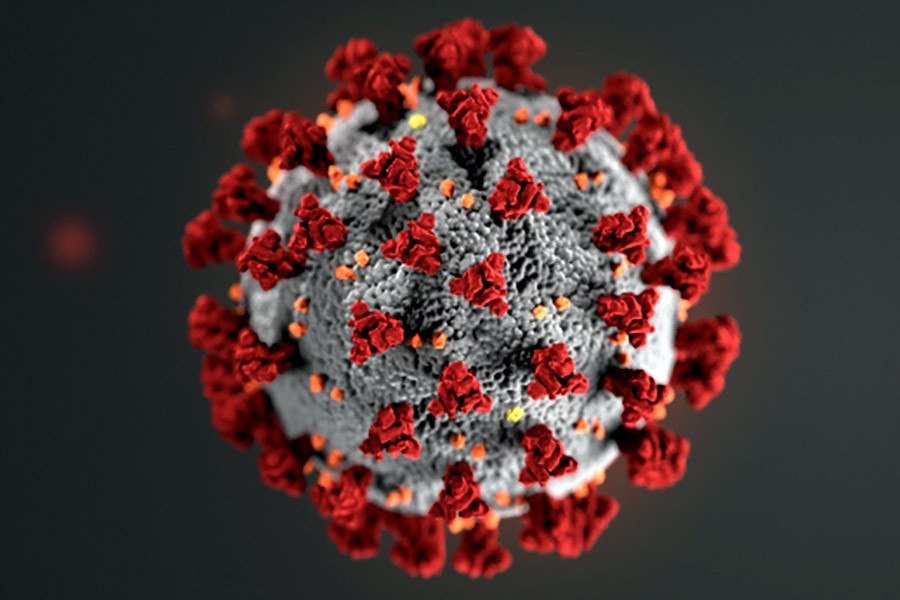
Published :
Updated :

As the country's daily Covid-19 cases crossed the 1,000 mark on Wednesday after nearly four months, experts feared that the fourth wave of the pandemic has begun in some clusters in the capital.
They said two Omicron sub-variants--BA.4 and BA.5--are probably fuelling the fresh spike in Covid infections like in some other countries in the world, and warned that coming weeks could see exponential growth in daily Covid-19 cases as the community transmission may begin soon.
The public health experts, however, think the new wave is unlikely to be as virulent as the previous ones since a very large number of people have some sort of antibodies gained either by infection or vaccination.
DGHS spokesperson Dr Robed Amin, IEDCR adviser Dr M Mushtuq Husain and former World Health Organisation (WHO) Regional Advisor Muzaherul Huq made the observations while talking to UNB.
They emphasised strict maintenance of Covid-19 protocols, including the cent per cent use of masks and ramping up of vaccination to bring the most elderly persons under the coverage of the booster dose of the Covid vaccines to slow down the infection.
Bangladesh recorded 1,319 new cases and one death on Thursday while one death and 1,135 cases on Wednesday.
The country recorded over 1,000 Covid cases (1409 cases) with 11 deaths last on February 25.
The daily-case positivity rate jumped to 14.32 per cent from Wednesday's 13.30 per cent as 9,214 samples were tested, according to the Directorate General of Health Services (DGHS).
According to the data provided by the DGHS, more than 118.6 million people have so far received two doses of Covid vaccines while 128.9 million people the first dose.
Besides, over 28 million people have received booster dose in the country. The government has so far inoculated only the people aged 12 and above against Covid-19.
Talking to UNB, Robe Amin said Omicron's sub-variant BA.4 and BA.5 have been spreading in many places globally. "I think the transmission of these two sub-variants is behind the surge in Covid cases in our country. We're waiting for the gene sequencing report to be confirmed about it."
He said the uptrend of the virus cases will continue for at least three more weeks. "But this wave may not be a virulent one. As the hospitalisation is still very low compared to the growing cases, we can assume this wave may not be a severe one."
Unlike many other countries in the world, Robed said the Bangladesh government is yet to relax the health safety rules and guidelines, including wearing masks, to remain safe from the virus. But people are not following it. That's why the virus cases are increasing again."
The DGHS official said Dhaka city is now witnessing the cluster transmission of the virus at different pockets, but it won't be possible to control as people are roaming here and there without wearing masks and maintaining other health safety rules.
He also said they are still not getting the genuine picture of the Covid transmission as many people having the symptoms of the virus are not going for Covid tests.
He said they are ready to tackle if the Covid situation deteriorates further. "Around 2,000 hospital beds are ready to treat the Covid patients. "People's awareness about maintaining health safety rules and wearing masks is now necessary to tackle the situation and contain the transmission."
Besides, Robed urged people to receive the booster dose of the vaccines. "Still many people did not receive the third dose. The infection may not be stopped by the vaccination, but it can lessen the severity. So, the elderly people and those who have comorbidities should receive the third dose alongside strictly maintaining the health safety rules.
Dr M Mushtuq said a sudden rise in Covid cases is an indication that Bangladesh has been witnessing the fourth wave of the pandemic.
He said the virus cases may continue to rise for three weeks if people properly follow the health protocols. "The virus has been spreading on a cluster basis in Dhaka while some districts are also witnessing sporadic transmission. "But the community transmission will begin soon." '
The public health expert said the new wave was inevitable but it came a bit earlier due to people's apathy to maintain health safety rules and wearing masks. "On the other hand, the immunity gained through the natural infection or vaccination decays after three months."
"We hope this wave won't be deadly one as around 70 per cent people already received two doses of the vaccines, while many people have natural antibodies through the exposer to the virus," Mushtuq said.
He, however, warned that the elderly and immune compromised people should be given the third dose of the vaccine as early as possible to reduce mortality.
Besides, the expert said the government should strictly enforce the health safety rules and discourage mass gatherings, public rallies and social gatherings.
Dr. Mushtaq said, "We have to find out who are not yet vaccinated. Older people, especially those who have not taken the booster dose, must be vaccinated."
He said the government should immediately go for contract tracing to identify people who came close to the infected people and send them to isolation centres. "We should now strictly follow it as the number of cases is still very low.
Besides, he said the government should encourage people having symptoms of the virus to undergo Covid tests. "Testing, contract tracing and isolation are the basic principles to contain the virus. If the virus-carrying people remind unidentified it will be difficult to contain the transmission."
Dr Muzaher said the government should prepare the upazila health centres for providing people necessary treatment to reduce the mortality as the virus may spread to different districts.


 For all latest news, follow The Financial Express Google News channel.
For all latest news, follow The Financial Express Google News channel.